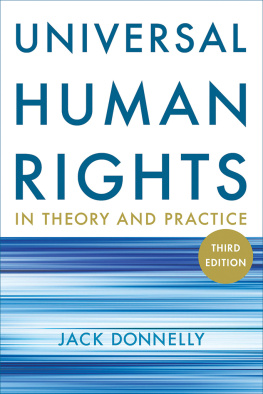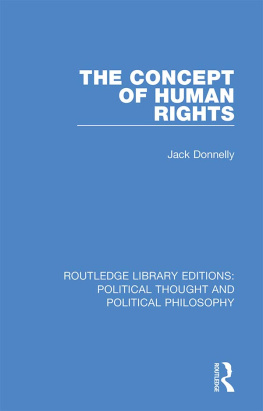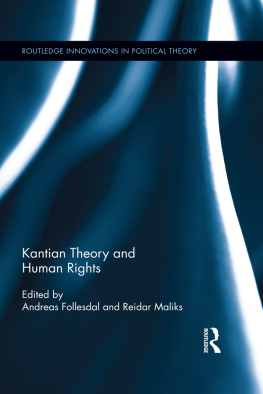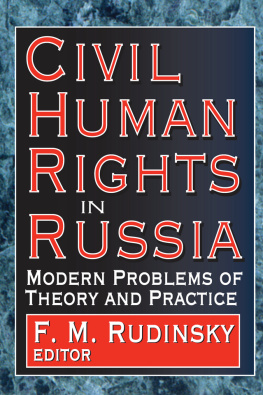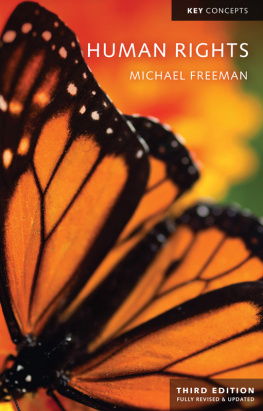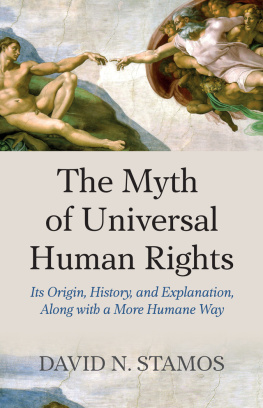Preface to the Third Edition
Pierre Vidal-Naquet, one of the great classicists of our time (although perhaps better known for his human rights work as a historian of French crimes during the Algerian war), observed that for reasons that are my own and are probably not too rational, in Greek studies the article is much easier for me than the book (Vidal-Naquet 1986: xv). Much the same is true of my writings on human rights, which naturally seem to be more or less self-contained but interconnected units of about eight thousand words. The first edition of Universal Human Rights in Theory and Practice represented the coalescence of several essays written in the early and mid-1980s that were linked by their defense of a conception of universal human rights that acknowledges and incorporates the obvious historical contingency of both the idea of human rights and its dominant international expressions. The second edition represented both a continuation of the process of essay accumulation and a response to the aging of the first edition. This third edition is more of the same.
The first edition, which I delivered to the press in the fall of 1988, bore the unmistakable stamp of the Cold War. The second edition, delivered at the end of 2001, reflected its postCold War context. This edition, delivered in the middle of 2012, reflects, I hope, a more nuanced engagement with globalization and the special context it provides for discussions of universality. And this changing context is an important part of the book. Although primarily theoretical, it engages, both directly and indirectly, issues of immediate political significance.
I have deleted all or most of four chapters, added five that are largely or wholly new, radically reorganized the material in three others, and updated and refined most of the rest. The result is a third edition that is about half new. It is, however, a genuine third edition (rather than a fundamentally new book), with the same substantive focus, the same basic arguments, a similar structure, and much the same feel. Those who liked the first two editions will, I think, find this a rejuvenated version of the book they have known. Those who did not like them will, I am sure, find fresh provocations. With luck, this edition may attract some readers not familiar with the earlier editions.
Permission to reprint material that has appeared previously, in different form, has been granted by The Johns Hopkins University Press, which gave permission to reprint here as chapter 13 a revised version of Human Rights, Democracy, and Development, Human Rights Quarterly 21 (August 1999), and MIT Press, which gave permission to reprint as chapter 12 a much shortened version of International Human Rights: A Regime Analysis, International Organization 40 (Summer 1986).
This book has grown, almost organically, over the course of thirty years. Like most authors, I have accumulated numerous debts in writing (and rewriting) it. I am afraid, though, that I simply cannot adequately acknowledge them. Rather than rely on faulty memory and even worse record keeping, let me simply say thank you (you know who you are).
It is much easier to acknowledge my personal debtsto my wife Katy and son Kurosh. The first edition of this book was part of my introduction to Katy. The second edition appeared just when she arrived in this country. She has lived with me through the production of the third edition, without question the best decade of my life. And with her and our sonwho although only fifteen months old has long since figured out that computers unfairly interrupt the essential work of paying attention to himI am looking forward to the time between now and the fourth edition.
Introduction
This book aims to explicate and defend an account of human rights as universal rights. I do not, however, argue that human rights are timeless, unchanging, or absolute. Quite the contrary, I show that any list or conception of human rightsand the idea of human rights itselfis historically specific and contingent. Nonetheless, I argue that the particularity of human rights is compatible with a conception of human rights as universal rights.
The book is divided into five parts. Part I sketches the outline of a theory of human rights. Chapter 1 begins analytically, looking at the character of rights in general and human rights in particular. Chapter 2 then provides a largely descriptive sketch of the dominant contemporary understanding of human rights. Chapter 3 considers the two principal theoretical challenges to this dominant understanding, namely, the status of economic and social rights and the near complete absence of group human rights. Chapter 4 then offers a liberal, substantive justification of this model.
Part II turns to the issue of the universality and relativity of human rights. Rather than see this as an either-or choice, or even a matter of degree, I argue in chapter 6 that in some important senses of the term human rights these rights are universal but that in other, no-less-important senses they are not. I also argue that in some important senses of the term human rights these rights are relative, but in other, no-less-important senses they are not. These arguments build not only on the theory outlined in part I but also on chapter 5, which demonstrates that ideas and practices of human rights, in the Western and non-Western worlds alike, are an entirely modern (and in many ways a twentieth-century) phenomenon. Chapter 7 then explores some of the implications of this understanding, focusing on the issue of responsible advocacy of universal human rights in a world of particularity.
Part III continues the discussion of the historical particularity of human rights in the context of the foundational claim in contemporary international human rights law that human rights derive from the inherent dignity of the human person. Chapter 8 shows that in the West prior to the late eighteenth century, dignity, rather than being a term of universalistic inclusion, was a particularistic term of hierarchical exclusion; only a small portion of the population was seen as having dignity. The contemporary notion of universal human rights, in other words, rests on a radical democratization of the notion of dignity, seen as an inherent attribute of all human beings rather than the achievement of a small elite. Chapters 9 and 10 develop similar arguments for Confucian China and Hindu India.
Part IV turns to the international politics of human rights. Chapter 11 provides an extended survey of multilateral human rights regimes. Chapter 12 considers bilateral foreign policy.
Part V concludes the volume by examining four contemporary areas of political controversy: the relationship between human rights, development, and democracy; Western attitudes toward economic and social rights; humanitarian intervention; and discrimination against homosexuals. In each case I try to show that a clear theoretical grasp of human rights and the particular character of their universality can make an important contribution to ongoing national and international policy debates.
Two general themes merit emphasis here. The first is methodological: the necessarily multidisciplinary character of the study of human rights. The second is more substantive: the interaction of theory and practice.
Consider the range of issues covered by the Universal Declaration of Human Rights, which recognizes personal rights to life, nationality, recognition before the law, protection against torture, and protection against discrimination on such bases as race and sex; legal rights to a fair trial, the presumption of innocence, and protections against ex post facto laws, arbitrary arrest, detention or exile, and arbitrary interference with ones family, home, or reputation; a comparable variety of civil liberties and political rights; subsistence rights to food and health care; economic rights to work, rest and leisure, and social security; social rights to education and protection of the family; and the right to participate in the cultural life of the community. A comprehensive account of these rights would require that we combine, at minimum, the perspectives of law, political science, economics, and sociologyplus philosophy, if we want to understand the conceptual foundations of human rights and the justifications for this particular list.

